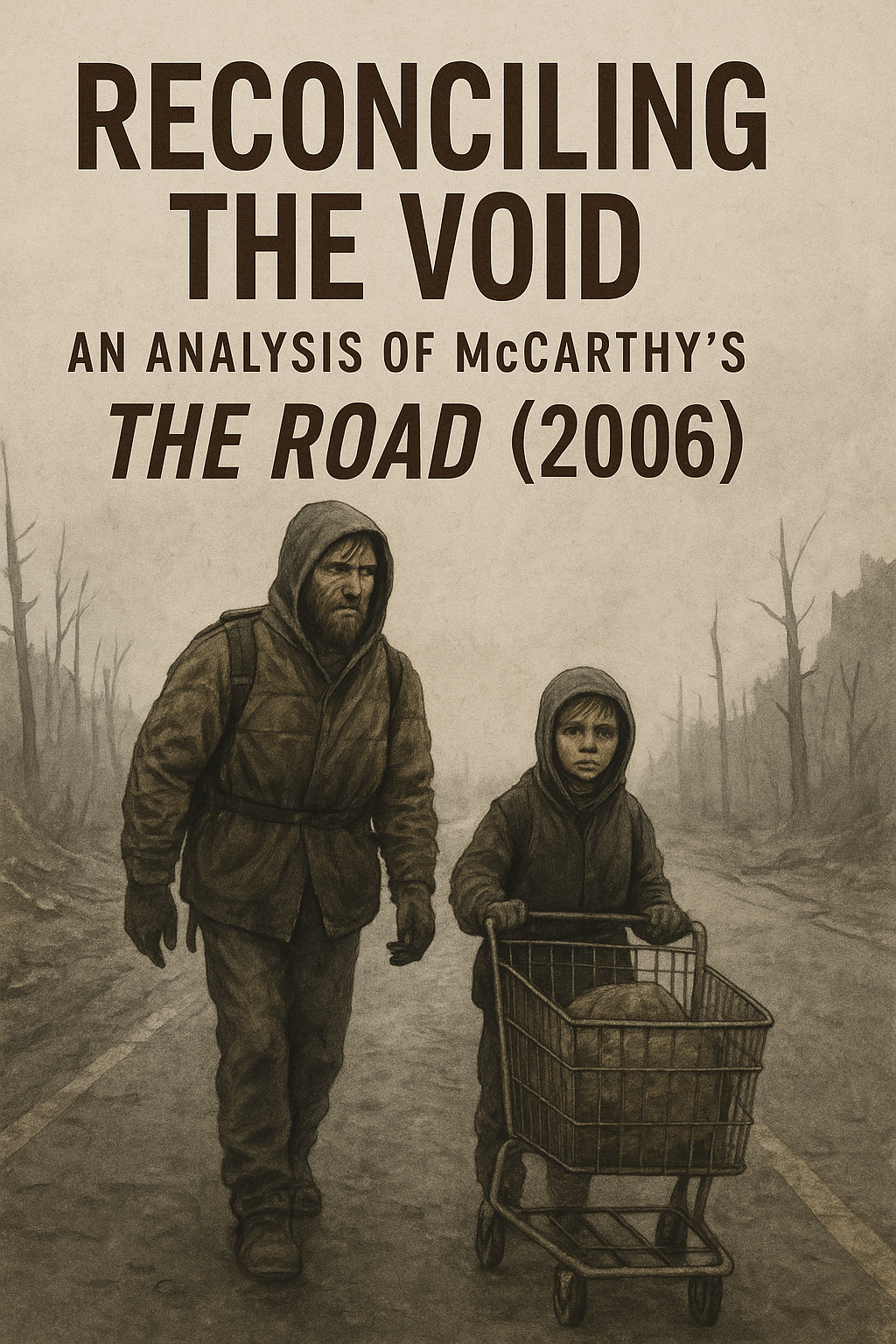Reconciling the Void: An Analysis of McCarthy’s The Road (2006)
Keywords:
Reconciliation, Void, McCarthy, The Road (2006), TranscendentalismAbstract
Cormac McCarthy’s The Road (2006) presents a stark, post-apocalyptic world stripped of structure, meaning, and divine presence, yet within this narrative of devastation lies a profound exploration of survival, love, and metaphysical reckoning. This paper investigates how the novel confronts the concept of “the void”—a space of absence, death, and spiritual silence—while simultaneously offering the possibility of reconciliation through human connection and moral perseverance. By analyzing the unnamed father and son’s journey, the essay examines how their bond functions as a moral axis in a world where traditional systems of belief and ethics have collapsed. Through close textual analysis and philosophical reflection, the paper argues that The Road both acknowledges and resists nihilism: the void is not denied, but met with acts of care, memory, and storytelling. The narrative’s sparse language and recurring imagery of fire, darkness, and silence are read as stylistic manifestations of McCarthy’s existential concerns. Special attention is given to the novel’s ending, particularly the trout passage, which offers a potential vision of beauty and permanence amidst ruin. This moment is interpreted not as resolution, but as a final gesture toward the unknowable—a symbolic reconciliation with the void that defines the novel’s moral and metaphysical terrain. Drawing on existential and post-theological frameworks, the paper positions The Road as a literary meditation on endurance, meaning, and the remnants of faith in a disintegrated world.
Downloads
References
Aldridge, J. W. (1983). The American Novel and the Way We Live Now. New York: OUP.
Barth, J. (1984). The Friday Book: Essays and other Nonfiction. New York : Putnam. Burroughs, W. S. (1992). Naked Lunch. London: Grove Atlantic.
Bloom, H. (2002). Milan Kundera. USA: Chelsea House.
________. (2009). Cormac McCarthy. US: Chelsea.
Calvino, I. (1978). Invisible Cities. NY: Harvest Book.
Coetzee, J. M. (1983). Life & Times of Michael K. London: Secker & Warburg.
___________. (1999). Disgrace. London: Secker & Warburg.
Clute, J. (2006). The End of the Road. Science Fiction Weekly, 497 (October 30).
Davis, T. F., & Womack, K. (2006). Postmodern Humanism in Contemporary Literature and Culture. NY: Palgrave Macmillan.
Demastes, W. W. (1998). Theatre of Chaos: Beyond Absurdism, into Orderly Disorder. U.K: Cambridge University Press.
Edgar, A. (2008). Cultural Theory. London: Routledge.
Esslin, M. (1969). The Theatre of the Absurd. USA: Doubleday & Company.
Gallagher, C. (1986). Marxism and the New Historicism.The New Historicism. H. A. Veeser (Ed.). New York: Routledge.
Kennedy, W. (2006). Left Behind: Review of The Road . New York Times.
Lock, J. (2008). An Essay Concerning to Human Understanding. Oxford: Oxford University Press.
Marquez, G. G. (1970). One Hundred Years of Solitude. (G. Rabassa Trans.). New York: Harper.
McCarthy, C. (2006). The Road. London: Picader.
Mullins, M. (2012). Hunger and the Apocalypse of Modernity in Cormac McCarthy’s The Road. Symploke.
Schaub, T. (2013). Secular Scripture and Cormac McCarthy’s The Road. In Renaissance: Essays on Values in Literature, 61.3.Milwakee: Marquette University Press.
Sim, S. (2001). Ed. The Routledge Companion to Postmodernism. London: Routledge.
Silberman, L. (1986). God and Man in Oedipus Rex. College Literature, Vol. 13, No. 3. http://www.jstor.org/stable/25111712.
Strindberg, A., & Carlson, H. G. (1983). Strindberg, Five Plays. Berkeley: University of California Press. Snyder, P. (2008). Hospitality in Cormac McCarthy’s The Road. In The Cormac McCarthy Journal, 6, 2008.
Tyburski, S. J. (2008). The Lingering Scent of Divinity in The Sunset Limited and The Road. In The Cormac McCarthy Journal, 6.
Vanderheide, J. (2008). Sighting Leviathan: Ritualism, Daemonism and the Book of Job in McCarthy’s Latest Works. In The Cormac McCarthy Journal. Vol. 6.

Downloads
Published
Issue
Section
License
Copyright (c) 2025 Dr. Junaid Mahmud, Dr. Muhammad Javed Iqbal, Aneeq Sajid (Corresponding) (Author)

This work is licensed under a Creative Commons Attribution-NonCommercial 4.0 International License.
Authors retain the copyright of their work. All articles in Scholar Insight Journal are published under the terms of the Creative Commons Attribution 4.0 International License (CC BY 4.0).
This license permits anyone to read, download, copy, distribute, print, search, or link to the full texts of the articles, and to use them for any other lawful purpose, without asking prior permission from the author(s) or the publisher, provided proper attribution is given to the original work.




